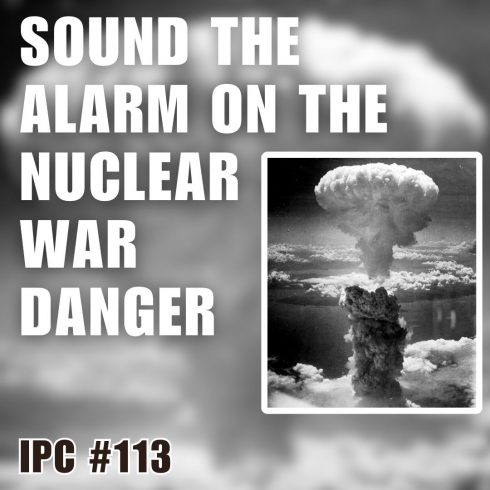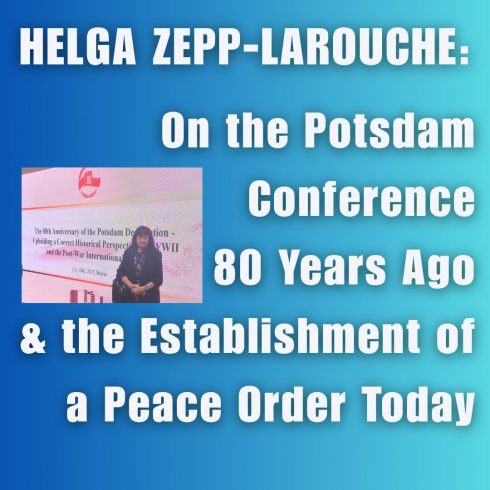Join Helga Zepp-LaRouche and Diane Sare in their live dialogue and discuss the issues and solutions that move the world and its people. Send your questions, comments, and reports to questions@schillerinstitute.org or post them in the next live stream.
In an interview with Global Times, Helga Zepp-LaRouche was asked whether China’s Global Civilization Initiative, which Zepp-LaRouche has repeatedly emphasized as the only viable solution to the global crisis, offers a new model for the interaction of different cultures in today’s world. Zepp-LaRouche replied that her institute [the Schiller Institute] was founded in 1984 with the same idea, that the world needs a new and just world economic order, but that this can only work if it is combined with the concept of a dialogue amongst all cultures, so that each nation or civilization can learn about the best cultural contributions of all other nations or civilizations. By getting to know the beauty of other cultures, all prejudices and fears would disappear and make way for the joy of discovery and even love. She said that, when she read about the Global Civilization Initiative, she was very happy and confident that this initiative would help make wars obsolete, because when you get to know the best creations of different peoples, it completely changes your perspective. By engaging with the best of other nations, one forms friendships and discovers that all these works of art are based on a human quality which unites us as a species.
Looking at the situation in Gaza, but also at the unchecked urge of European states to further escalate tensions with Russia, it is becoming increasingly clear to more and more people that the future of humanity is at stake and that only such a great civilizational leap forward can ensure the survival of humanity.
The Integrated Food Security Phase Classification (IPC), which describes itself as a system for improving food security and nutritional analysis for decision-making, already stated on August 22 that famine prevails in the Gaza Strip. Data from an internal Israeli intelligence database shows that at least 83 percent of Palestinians killed in Israel’s attack on Gaza were civilians, as revealed by research conducted by +972 Magazine, Local Call, and the Guardian on August 21. And an Israeli attack hit the fourth floor of Nasser Hospital in Khan Yunis, killing more than 20 people. Among the dead are at least four journalists, including freelancers from AP, Al Jazeera, and Reuters.
On Friday last week, Helga Zepp-LaRouche began the 116th meeting of the International Peace Coalition emphasizing the importance of the campaign to activate UN General Assembly Resolution 377 (“Uniting for Peace”) and intervene against the atrocities in Gaza and the West Bank. A person associated with the UN told her that sending blue helmets to the region in accordance with Resolution 377 would have a significant regional and global impact in countering Israel’s atrocities.
Regarding the so-called conflict between Ukraine and Russia, die-hards in the EU are trying to undo the successful summit between President Trump and Putin in Alaska to further prolong and extend the war, which will be fought not only to the “last Ukrainian” but possibly to the last human being. The relevant “heads of state” seem indifferent to the consequences of escalation, remilitarization, progressive economic collapse, and a possible nuclear war.
Following the August 3 surprise arrest in Italy of a Ukrainian citizen suspected of organizing the Nord Stream bombing, a special session of the UN Security Council will meet today, at Russia’s request, to discuss the sabotage of the Nord Stream pipelines.
The chairwoman of the Schiller Institute, Helga Zepp-LaRouche, supported the request and called for the establishment of an independent investigative committee.
Virtually all serious observers see the arrest as just another attempt to cover up those truly responsible for this act of sabotage, which required intelligence information, sophisticated equipment, and skill. Uncovering the truth about who ordered and carried out the international act of terrorism in September 2022 and who staged the cover-up is central to restoring trust and diplomacy in the world.
Join Helga Zepp-LaRouche and Diane Sare in their live dialogue and discuss the issues and solutions that move the world and its people. Send your questions, comments, and reports to questions@schillerinstitute.org or post them in the next live stream.




















